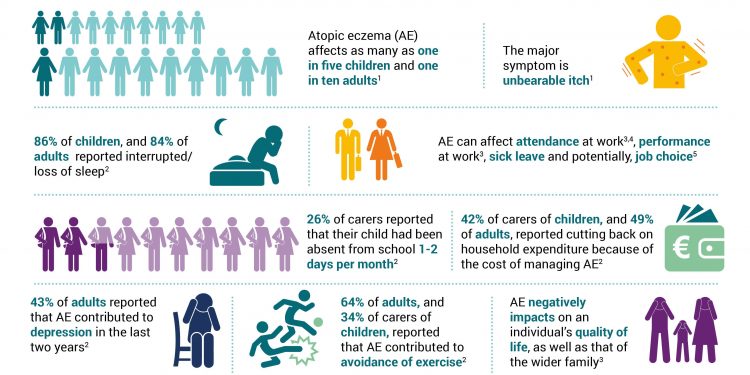World Atopic Eczema Day: New Irish Survey Shows Hidden Burden of Common Skin Condition
- Atopic eczema affects as many as 1 in 5 children and 1 in 10 adults
- 86% of children and 84% of adults surveyed report interrupted sleep
- Over a quarter (26%) of carers report 1-2 days absent from school each month
- 454 people with eczema or caring for someone with eczema took part in the ‘Living with Atopic Eczema Survey’
- Irish Skin Foundation to host a panel discussion on atopic eczema at skin health event, SkinSideOut on 16th November
New Irish survey findings released today by the Irish Skin Foundation (ISF) ahead of World Atopic Eczema Day (14th September), reveal the hidden burden of this common skin condition, with over 40% of those surveyed reporting the need to cut household expenditure because of the day-to-day cost of managing atopic eczema.
Atopic eczema (AE), or atopic dermatitis, is a common, non-contagious, inflammatory skin condition. AE can start at any time of life but is most common in childhood and is thought to affect as many as one in five children and one in ten adults.
The cost of eczema treatments and doctor’s appointments needed to manage the condition can be a significant financial burden. The ISF survey revealed that 42% of carers of children and 49% of adults reported cutting back on household expenses due to the cost of managing AE. Over 40% Cut Household Expenditure Due to Cost of Managing Eczema. The figures suggest that one-quarter of those surveyed spend at least €2,300 annually on doctor’s fees, over-the-counter management products, and prescription treatments.
The survey findings also reveal the pronounced negative impacts that AE can have on the quality of life, including sleep disruption, absences from school, as well as participation in exercise and social activities. A major symptom of AE is intense itch, which is commonly reported to disrupt sleep, with findings revealing that the overwhelming majority of children (86%) and adults (84%) living with AE experience ongoing sleep disturbance. Additionally, more than a quarter (26%) of carers of children with eczema say their child missed 1-2 days of school per month due to their condition, with over a third (34%) of children and two-thirds (65%) of adults admitting to avoiding exercise, activities, and sports. More than half (52%) of adults surveyed avoid social activities altogether.
Consultant Dermatologist, Professor Anne-Marie Tobin said, “These new Irish survey findings provide us with valuable insights into the often-hidden burden experienced by those living with or caring for people with moderate-severe atopic eczema. To mark the 2nd World Atopic Eczema Day, the ISF survey findings further underscore that people living with this very common condition experience a whole host of challenges in their daily lives, beyond the pain and discomfort of this very common debilitating skin disease.”
Irish Skin Foundation CEO, David McMahon said: “The disruption and stress that moderate and severe atopic eczema can cause is very clear from the findings of our recent survey. And while we know that the family impact of atopic eczema can be profound, we were surprised how disturbed sleep, lost school days and potentially, productivity features so strongly.
“Our work with families impacted by eczema, particularly at this time of the year as the school term starts back, focuses on supporting people to re-establish care routines that will strengthen the skin barrier. This is quite important in advance of the weather cooling and central heating being turned on again in the autumn, both of which can be a challenge for vulnerable skin and can lead to flares.
“The Irish Skin Foundation”, he added, “has plenty of great simple tips, guidance, and resources for anyone who wants to establish a new skin barrier care routine at www.IrishSkin.ie. The charity also operates a free Helpline with access to specialist dermatology nurses who provide one-to-one guidance about a range of skin conditions and problems.”
The findings from the ISF’s ‘Living with Atopic Eczema Survey’ were gathered from 454 participants living with predominately moderate-to-severe eczema or caring for someone with eczema in Ireland. The ISF released the findings to highlight the hidden burden of the disease ahead of this year’s World Atopic Eczema Day on 14th September. This year, the ISF joins GlobalSkin, a unique global alliance, committed to improving the lives of patients with skin conditions worldwide, in raising awareness and understanding of the impact of eczema on patients’ lives.
An ‘Atopic Eczema Panel Discussion’ given by medical experts and patient advocates will take place at the ISF’s skin-health information and awareness event, SkinSideOut, on the 16th November, Science Gallery, TCD, Dublin.
Tickets for SkinSideOut are available to purchase via Eventbrite. For more information on SkinSideOut, the ‘Atopic Eczema Panel Discussion’ and more on other skin conditions included in the programme visit www.IrishSkin.ie.








